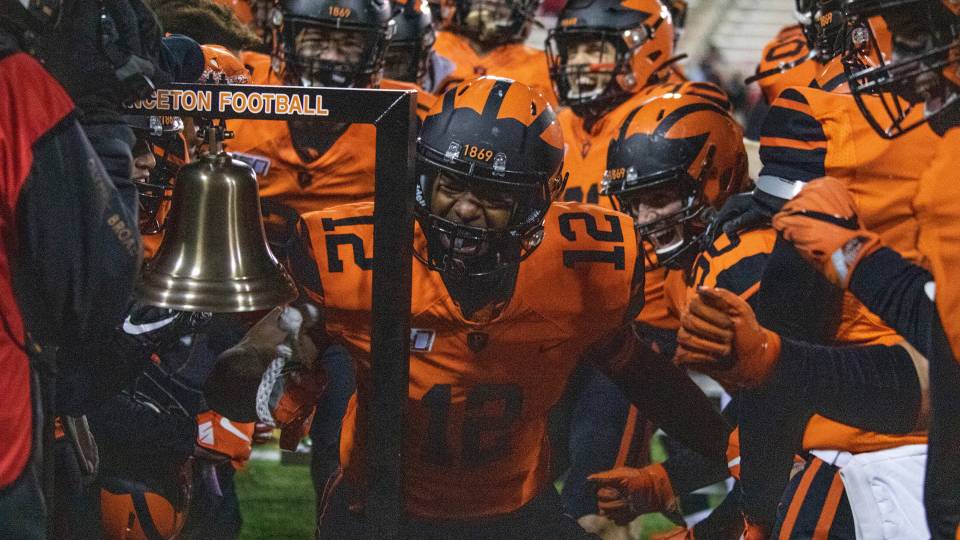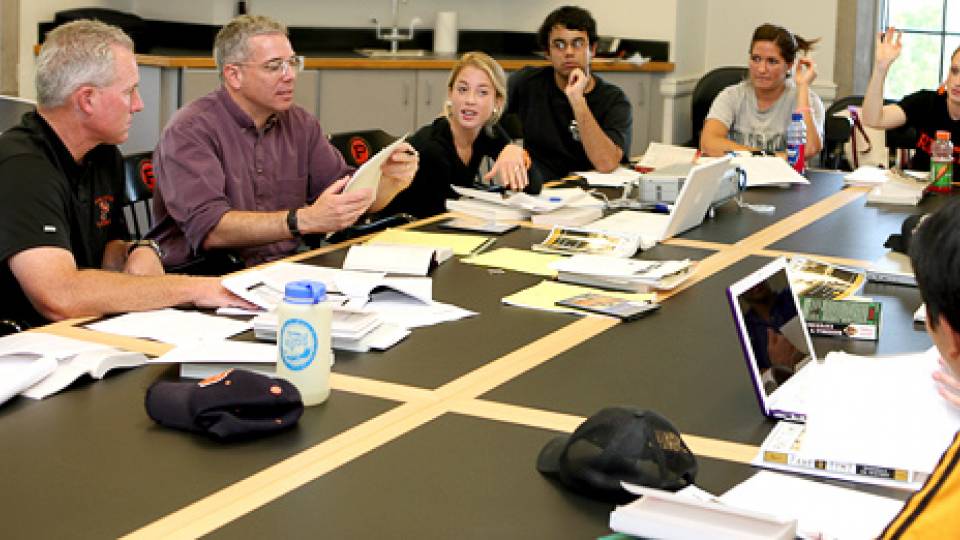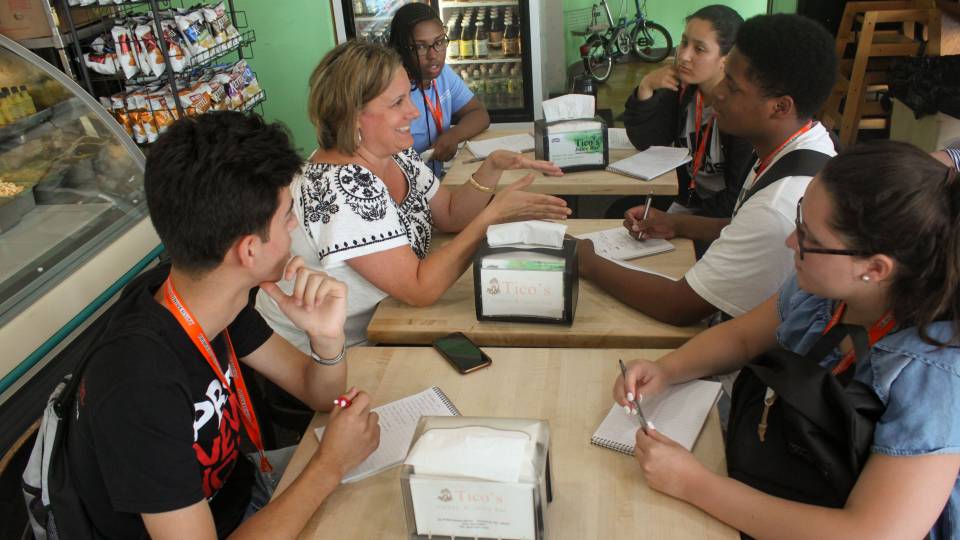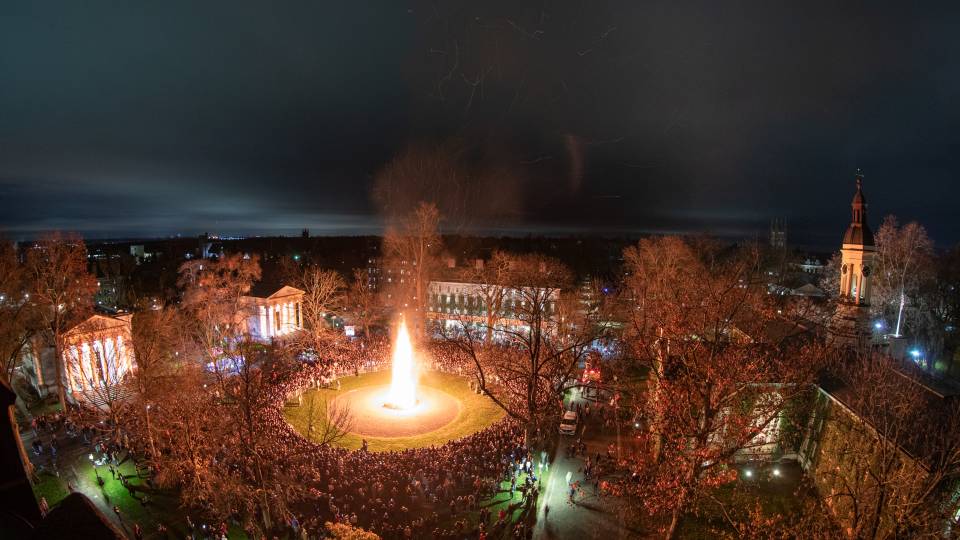This fall, a bus carrying students from a Princeton writing seminar arrived at MetLife Stadium in the Meadowlands for a Monday Night Football game between heated NFL rivals the New York Giants and the Dallas Cowboys. The students filed out, notepads and phones in hand to record interviews and take in the scene.
The assignment? Write about anything but the game.
Steve Fainaru, visiting lecturer in the Humanities Council and McGraw Professor of Writing, used the exercise to show how sports can be “a prism to so many different things,” from human rights to income equality to public health.
Fainaru won the Pulitzer Prize for International Reporting as a writer at The Washington Post in 2008 “for his heavily reported series on private security contractors in Iraq that operate outside most of the laws governing American forces."
He is now a senior writer and investigative reporter for ESPN. Fainaru’s book “League of Denial: The NFL, Concussions, and the Battle for Truth,” co-written with his brother Mark Fainaru-Wada, was a New York Times bestseller and won the 2014 PEN/ESPN Award for Literary Sports Writing. That and a PBS documentary based on the book raised national interest about chronic traumatic encephalopathy (better known as CTE) and its impact throughout the NFL.
On that Giants-Cowboy game night, students in Fainaru’s McGraw Seminar in Writing, “What Sports Tells Us about Our World,” took to the parking lots to write about topics including love, Black Lives Matter, tailgate cuisine, the ritual burning of a Cowboys jersey and the beanbag game, “cornhole,” which one student dated to 1325 Germany. The course was offered through the Program in Journalism, housed in Princeton’s Humanities Council.
As students began to use the “universal language” of sports to tell stories as journalists, “I started to realize how industrious and imaginative and creative and thoughtful they are,” Fainaru said.

Steve Fainaru, visiting lecturer in the Humanities Council and McGraw Professor of Writing, encouraged students to consider how sports can be “a prism to so many different things,” from human rights to income equality to public health. Fainaru won the Pulitzer Prize for International Reporting as a writer at The Washington Post in 2008 and is now a senior writer and investigative reporter for ESPN.
Sports as a lens on society
The course began with students writing memos to start building a story up from the ground floor, then doing interviews and fact-checking. Reading assignments focused on events and larger themes in sports like the National Basketball Association’s relationship with China, Colin Kaepernick’s national anthem protests, and controversies around Title IX. These stories would help influence student assignments and ideas for what subjects to cover.
In the first weeks of the semester, students began to develop stories on the NCAA’s mental health policies, the online harassment of college athletes (including Princetonians) by disgruntled gamblers, and the everyday indignities faced by female athletes — 50 years after the passage of Title IX.
“If the New York Times wrote these stories tomorrow, no one would be surprised,” Fainaru said of some of the student reporting.
Many students came into the class with a love for sports. First-year student Harrison Blank’s mother played tennis at Princeton. Junior Kalena Blake, a member of Princeton’s lightweight rowing team, has fond memories of watching football with her dad growing up. Olivia Robinson, a junior in the class, is a member of the varsity squash team.
But the class reached further. “It’s everything I’ve wanted to study and didn’t know I could,” said senior Susan Baek, who now plans to pursue journalism as a career after graduation. “It’s not about the game. It’s about reporting on the world around the game.”
Through in-depth discussions surrounding several complex social and political issues – from CTE and the NFL to staging the World Cup in Qatar against a backdrop of discrimination and human rights abuses – Fainaru pressed students to look beyond the spectacle of touchdowns and slam dunks, digging deeper and asking why and how fans consume sports, and why certain images predominate on their screens.
“It’s made me a little more critical of what I’m watching,” said Blake.
“Sports are not excluded from the fact that everything comes down to the bottom line,” said Baek. While money is one of the biggest driving forces, the class has taught her that it’s not always cut and dry, she said. “There’s always more to the story.”
And while sports have the ability to bring diverse people and communities together, students came to see that the narratives associated with games and players also reflect the divisive flash points in society.
“Sports and politics are so intertwined – sports and race, sports and social movements,” Robinson said. “Sports are not just entertainment.”
That point hit home viscerally on Jan. 2 when Buffalo Bills safety Damar Hamlin went into cardiac arrest during a nationally televised game and even casual fans questioned their complicity in the near death of a young man playing the sport he loves. Although the semester was over, one student reached out to Fainaru wishing class had been in session that week to discuss Hamlin’s collapse and the questions it raised.
Takeaways for a first-time teacher
This fall was Fainaru’s first time teaching at any level. He said he was struck by the range of backgrounds in the classroom — a mix of class years, some students with journalism experience and others with none, some student-athletes and others who had never attended a football game.
“How do you design a class to try and to make sure that everybody’s needs are met?” was a question he found both challenging and stimulating.
His students eased the way by being “generous and understanding,” he said, “with me and with each other. It really touched me.”
In addition to teaching this semester, Fainaru also joined in conversation about social justice and sportswriting with Tera Hunter, the Edwards Professor of American History, professor of history and African American studies and acting chair of the Humanities Council, who has written extensively about the power and historical significance of Serena Williams.
At the lunchtime talk with Hunter, Fainaru spoke passionately about former Major League Baseball player Orlando Hernandez — better known as “El Duque” — and his 1997 defection from Cuba, chronicled in Fainaru’s 2001 book “The Duke of Havana.” He calls the World Series-winning pitcher’s odyssey from banished dissident to MLB fame “to this day, the most incredible story I think I’ve covered.”
Fainaru said he hopes students came away from the course with “an appreciation for journalism as both a public service and an integral part of society and the world. And an appreciation for facts and truth and news-gathering.”
He is scheduled to return to ESPN later this year and is also working on his next book, about the life and legacy of his late friend, the New York Times correspondent Anthony Shadid, who died in Syria in 2012.
He called his semester at Princeton “one of the most meaningful periods of my professional life.”







